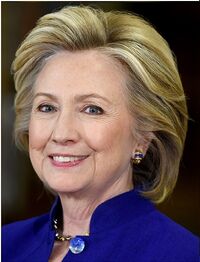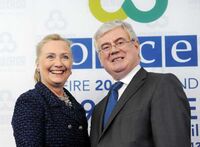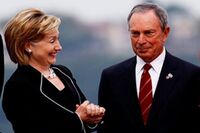Alastrí Nic Ualtair ⁊ Ní Deoradh
Alexis Walker Ghaillish: Alastrí Nic Ualtair ⁊ Ní Deoradh | |
|---|---|
 Walker in 2016 | |
| President of the Euclean Community | |
| Assumed office 1 November 2017 | |
| Preceded by | Alexandre Lévesque |
| Taoiseach of Caldia | |
| In office 18 June 2007 – 20 April 2017 | |
| Monarch | Elton II Kenneth IV |
| Deputy | Malcolm Fitzpatrick |
| Preceded by | Énna Ó Ceallaigh |
| Succeeded by | Jimmy O'Reilly |
| Minister of Foreign Affairs | |
| In office 1 January 2006 – 12 June 2007 | |
| Taoiseach | Énna Ó Ceallaigh |
| Minister of Trade and Tariffs | |
| In office 12 June 2002 – 1 January 2006 | |
| Taoiseach | Énna Ó Ceallaigh |
| Leader of the Liberty Party | |
| In office 1 April 2007 – 24 March 2017 | |
| Preceded by | Énna Ó Ceallaigh |
| Succeeded by | Jimmy O'Reilly |
| List Teachta Comhthionól | |
| In office 12 June 1997 – 12 May 2017 | |
| Teachta Comhthionól for Holyhead | |
| In office 12 June 1987 – 12 June 1997 | |
| Personal details | |
| Born | Alexis Eva Walker 15 August 1950 Invertwinc, Caldia |
| Political party | Liberty Party |
| Spouse | John Walker (1976-present) |
| Children | 4 children |
| Alma mater | University of Garrafrauns |
Alexis Eva Walker (Ghaillish: Alastrí Nic Ualtair ⁊ Ní Deoradh, born 15 August 1950) is a Caldish politician who is the President of the Euclean Community and served as the Taoiseach of Caldia from 2007 to 2017. She was elected EC President on 21 October 2017 after defeating Carolein Dykstra of the Socialist Alternative for Euclea. Walker is the first Caldish politician and third woman to hold the post.
She has previously served as Caldia's Minister of Trade and Tariffs and Minister of Foreign Affairs. Alexis became the leader of the Liberty Party following Enda Kelley's decision not to seek a second term as Taoiseach in the middle of the global recession. She assumed leadership two months before the 2007 general election and led the party to win the highest number of seats. She brokered a deal with Malcolm Fitzpatrick and formed a coalition with the Centre Party, which has governed the country from June of 2012 to 2017. She oversaw the Caldish response to the 2005-2011 global recession. For her response, she is credited with stabilizing the Caldish economy. She resigned as Taoiseach in April of 2017 before the 2017 general election and was succeeded by Minister of Justice and Equality Jimmy O'Reilly.
As President of the Euclean Community, Walker has overseen discussions surrounding structural reform and the EC's response to the 2018 Etruria Crisis, the 2019 Estmere-Zorasan Crisis, and the Tsabaran Crisis.
Early and private Life
Alexis Eva Dewar was born in 1950 in the city of Invertwinc. She was the first child of Margaret Fitzwallace-Tomasczweski and Seamus Dewar. Her maternal grandmother was born into an aristocratic family in Wazóvia-Loṭuyę, which was forced to flee following the end of the Great War and the start of the communist state in Wazóvia. Alexis' twin siblings, Katherine and Patrick, were born three years later in 1953. After attending school in Invertwinc, she obtained both her undergraduate degree and juris doctorate from the the University of Garrafrauns. She then went on to practice law as a civil rights attorney.
She met her husband, John Walker, while in law school. John was pursuing a doctorate in education in order to become a professor of business and economics. The two were married in 1976 and moved to Spálgleann the following year. Their oldest child, Matthew, was born in 1981. The Walker family moved to Pennsea in 1983 after John was offered a job at the University of Holyhead. The Walkers have four sons, Matthew, David, Luke, and Mark.
The family still lives in Pennsea, but also have a seashore home in Swansea. Since becoming EC President, Walker and her husband have moved to Kesselbourg. She is close friends with Gaullican President Jean Vallette and had a strong working relationship with Kenneth IV.
Early political career
Walker first ran to become one of the TCs for Pennsea in 1987, winning the post on the first count with 34% of the vote. She had previously served on the Holyhead County Council and was heavily involved in the politics of Pennsea, allowing her to make use of her name recognition.
She first served under Taoiseach Patricia Flowers on the backbenches, where she remained until the 1992 election which saw the Social Democrats take power in the Comhthionól, resulting in Walker being on the opposition benches for the next ten years. While she was in opposition, she became a member of the Comhthionól Committee on Trade and Commerce, the Comhthionól Committee on International Relief, and the Comhthionól Committee on the Euclozone. During this time she continued to build up a national profile, most notably during her tenure on the Comhthionól Committee on the Euclozone, to which she was appointed in 1996. Walker became a major advocate for Glytter's membership in the Euclozone and was often used by the Liberty Party as a spokesperson for the issue. Due to her rising profile, she would often be featured on the opposition frontbench under Tadhg Ó Scolaighe, who was leader of the party from 1997 to 2001.
While she was serving on the backbenches, she became friends with Sarah Pingins, who would become one of Walker's strongest allies.
Minister of Trade and Tariffs (2002-06)
After the victory of the Liberty Party at the 2002 Comhthionól elections, Énna Ó Ceallaigh became the Taoiseach. Kelley chose Walker to serve as the Minister of Trade and Tariffs due to her growing national profile and role in Glytter's entrance to the Euclozone. Soon into her term as Trade Minister, she began to shift Glytter away from the trade policies of the Social Democrats. Under Walker, Glytter largely regained its status as a tax haven. During her tenure as Minister of Trade and Tariffs Glytter also saw the arrival of high profile Asterian and Euclean corporations, who set up their Euclean offices in Glytter due to the policies implemented under Walker.
It was when she was at the Trade Ministry that Walker began to work closely with EC leaders, as she was tasked with ensuring the transition into the Euclozone for Glytter continued to run smoothly. Walker began to play a key role in Glytter's Euclean policy and is credited with moving the party towards an openly pro-Euclea stance.
Minister of Foreign Affairs (2006-07)
Walker was named Minister of Foreign Affairs by Enda Kelley in 2006 after the resignation of her predecessor, Peter Brennan. While her tenure at the Foreign Ministry was short, her impact as Foreign Minister is considered to be monumental. As Minister of Foreign Affairs, Walker laid the foundations of the Walker Doctrine, which has become the cornerstone of Glytter's foreign policy in the 21st century. She argued that nation's are not only more representative, but also safer when they include women, LGBT+ members, and people from ethnic minorities in governance. As a result, Walker believed that violence against these groups should be considered issues of national security. She also began to tie the use of foreign aid money to a nation's human rights record, stating that "nations who violate the basic rights of their own citizens should not only fail to receive Eastern aid, but should actively receive condemnation from both developed and developing nations".
She also oversaw the beginning of the global recession of 2005-2011, which threatened the Euclozone. Walker, in cooperation with the Taoiseach, began to piece together the Glytteronian response. Kelley, who was met with a low approval rating, decided to ignore her suggestion that the Glytteronian government should help stablise the Euclozone by using the Petroleum Trust Fund. In an interview given in 2008, Kelley said that "if I had just listened to Alexis, I would have found a way out of the grave I dug for myself".
As Minister of Foreign Affairs, Walker is famously known for declaring that "women's rights are humans rights, gay rights are human rights, and human rights are women's rights and human rights are gay rights" while speaking to the Community of Nations' Centre for the Advancement of Women and Minorities. The speech catapulted her national profile, and made her the front runner to take over as Leader of the Liberty Party after Enda Kelley announced he did not wish to seek a second term.
Taoiseach of Caldia (2007-2017)
First term (2007-12)

Following Taoiseach Kelley's decision not to seek a second term as Taoiseach, Walker was one of five contenders for the leadership of the Liberty Party. In April of 2007 the Liberty National Convention was held and after three rounds of voting she emerged as the new leader of the party. Walker campaigned extensively before the 2007 Comhthionól election, launching a national tour of the country to meet with voters. Liberty emerged as the winning party, and was just shy of the majority needed to form a government on its own. On the 17th of June it was announced that the Centre Party would be forming a coalition with the Liberty Party. Malcolm Fitzpatrick became the Tánaiste and several Centre TCs were appointed to the cabinet.
The 29th Comhthionól convened for the first time on 18 June 2007 and elected Walker as Taoiseach by a vote for 262-87. She was 56 years old when she assumed the post. Soon after Walker and her family moved into Bán Thaisceadh, the official residence of the Taoiseach.
Initially, the Walker Government continued her predecessor's policy of supporting failing Caldish finance companies with public funding. The economy was recovering due to the National Recovery Act, which was enacted under Taoiseach Kelley in 2005, but growth was minimal and slow. Walker soon examined ways to further economic growth and pursued policies that lowered corporate taxes. The loss of tax revenue was made up for with funds from the Petroleum Trust Fund, which had previously been tapped by Kelley in order to bail out Glytter's largest bank, the Royal Bank of Glytter, after the financial crisis began.
Both domestically and abroad, Walker emphasized the enormous costs the financial crisis had in the form of a high unemployment rate, and warned of the risks posed by the lack of balance between austerity and economic growth stimulus, supported active labour market measures for young people, and fostered investments for increased innovation.
Walker was a strong advocate of international cooperation in response to the crisis, and encouraged foreign leaders to coordinate with one another. President Alexandre Lévesque of Gaullica met with Walker while she was Foreign Minister for the first time at a forum held by the Global Institute for Fiscal Affairs in 2006. Lévesque, like Walker, was a supporter of mutual coordination to solve the crisis.
- Abdication of Elton II in 2010
Second term (2012-2017)
- Energy reform
- 2016 attacks
- National security policy
Foreign policy
Resignation
On 1 January 2017, Walker made the announcement that she would not be seeking a third term as Taoiseach and planned to retire from politics. The move came as a surprise to many, as they expected her to comment on the results of the Caenese general election.
At the time, she confirmed that she would be stepping aside after her party chose a successor, but chose not to provide a specific date. Walker also announced she would be retiring as a TC, ending her thirty year tenure as a TC for Pennsea.
Walker cited health concerns over what she described as one of her most "mentally and physically draining years", pointing to the 23 August Attacks. In her speech to the Liberty National Convention on 23 March she confirmed she was suffering from PTSD.
At the March Liberty National Convention, Justice Minister Jimmy O'Reilly was chosen to serve as the next party leader, and in turn as the next Taoiseach. In the weeks after the Convention, Walker announced she would submit her resignation to the King on 20 April so O'Reilly could be formally appointed as Taoiseach following a vote in the Comhthionól.
On 20 April at 10:00, Walker met with the King for the final time at Spálgleann Palace where she submitted her letter of resignation. The King accepted and dismissed her as Taoiseach. At 10:15, a vote was put forth in the Comhthionól by Ceann Comhairle Nicolás Cummins to make O'Reilly Taoiseach, which passed by a wide margin.

